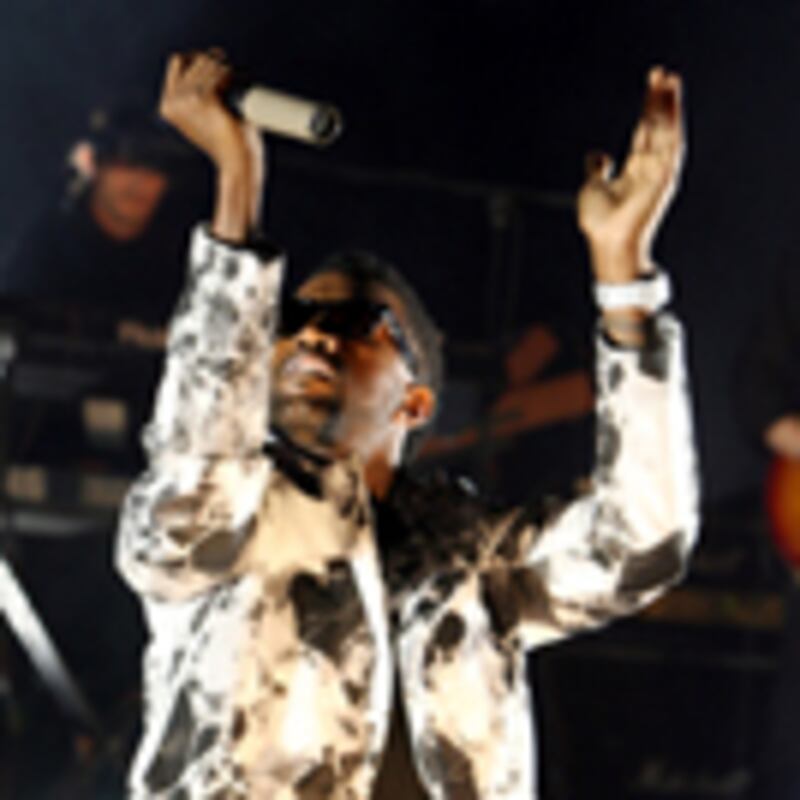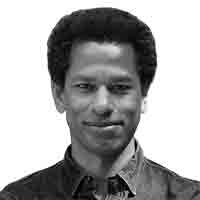
Last week, The Daily Beast’s Stanley Crouch wrote a column slamming Hip Hop—and calling for an era of “no mo hos." But his piece outraged Daily Beast columnist Toure, who fired back with this.
I knew it was just a matter of time before Stanley Crouch pulled out his old, dusty rant against hiphop and inflicted it on The Daily Beast. He’s been flogging this dead argument for more than 15 years. If his points fail to silence the competition, Crouch ain’t above doing his impression of a pernicious-stereotype-forwarding rapper and beating down a hiphop journalist. But there won’t be any violence spilling out of this here debate because I love Crouch—he’s long been like an uncle to me, and because we both appreciate a good debate.
We had the Supremes, you’ve got Niggaz Wit Attitude, what’s goin on?
Just a week ago I was watching Grey’s Anatomy with my wife when, during one of those emotionally charged moments that Grey’s executive producer Shonda Rhimes loves concocting, a Kanye West song rose up. It was Street Lights, a melancholy song about soul-searching, and I thought, wow, what a testament to the maturity and spiritual complexity of hiphop that a melodramatic moment between two white women on a Benetton-multiracial women’s show could be perfectly underscored by a hiphop song. This happened on a day when I’d browsed (but didn’t buy, oy the economy) at Barneys, Andre 3000’s grownup and ultra-preppy clothing line, Benjamin Bixby, as my iPod pumped mature and classy hiphop from Kanye, Andre, Q-Tip, the Roots, Lupe Fiasco, the Cool Kids, De La Soul, Mos Def, Talib Kweli, and MIA. These artists make up just part of hiphop’s growing intellectual wing, and they don’t fit into Crouch’s thesis so, like a professor teaching the same course year after year without change, he ignores them. I know he threw the word extreme in front of hiphop, but Jay-Z and Ludacris aren’t extreme or fringe hiphop, they’re cynosures.
It’s easy to point at a segment of any culture, especially the basest part, and make a derisive point about the whole group. But Lindsay Lohan and Paris Hilton don’t represent all young white women any more than the buffoons Crouch points at represent all of hiphop. Of course there’s pathetic buffoonery and modern minstrelsy inside the big tent called hiphop. Sure, hiphop sometimes overdoses on purposefully provocative language like a teenager having fun with shock value. We’re also, as a whole, too enamored of criminality and prison and too quick to lionize the drug dealer, as if he’s some heroic anti-establishment guerrilla entrepreneur. And we’re too linguistically inventive to be so staunchly anti-intellectual and anti-education. A new rapper fresh out of Leavenworth will get a lot of attention, while a rapper recently graduated from Harvard starts with two strikes against him even though talking about a suburban existence is keeping it crisply real for most hiphop fans.
But, also like a teen, hiphop sometimes surges toward a more mature place. Hiphop is both Soulja Boy shouting out to the slave masters because without them we’d still be in Africa, and Jim Jones renouncing “nigga” in deference to Obama. Yes, too many rappers are indefensibly misogynistic, too free with bitch and ho, though to be shocked on behalf of young black women reveals a quaint understanding of the music industry: For more than a decade the majority of hiphop consumers have been white teenage suburban males.
The greater misogyny is that hiphop as a whole (industry and fans) is too comfortable with women being at the periphery of the conversation. Sure, there are a few female rappers in the game, but there are about ten male rappers for every one of them. If hiphop is representative of the black community and there are more black women then men, then there should be way more sisters in hiphop rhyming about stuff like how mad they get when guys act brainless. Or what they’re gonna do to the next rapper who says bitch.
Though hiphop isn’t always the most evolved culture, it is the most politically involved musical culture in modern history. Hiphop in the ‘80s and ‘90s was critical of Reagan, the government, and the police; openly discussed Farrakhan; and railed against crack and AIDS. In the ‘80s you heard “wear your jimmy hat” so often in so many songs it felt like hiphop had undertaken a concerted marketing effort to get everyone to wear condoms. In the ‘90s Flavor Flav, buffoon of buffoons, made 911 Is a Joke, a funny but serious critique of Emergency Medical Services in urban communities. In ‘03 Jay-Z rhymed: “We rebellious, we back home screamin leave Iraq alone/ To all my soldiers in the field/ I will wish you safe return/ But only love kills war, when will they learn?” In ‘04 Eminem made Mosh, also attacking Bush: “Strap him with an AK-47/ Let him go fight his own war/ Let him impress Daddy that way/ No more blood for oil, we got our own battles to fight on our own soil.” Earlier this year Lil Wayne from New Orleans continued his ongoing discussion of Katrina: “My whole city under water/ Some people still floatin/ And they wonder why black people still votin/ Cuz your President still chokin.”
I hear Crouch and others of his generation saying where’s the humanity in your generation’s music? Where’s the tenderness? Why’s it so cartoonishly aggressive? We had the Supremes, you’ve got Niggaz Wit Attitude, what’s goin on? But I think what they don’t see is that they’re part of the answer.
A year ago, months before the Iowa caucus, back when the Obama candidacy still seemed quixotic to many, I went to an intimate, private Obama event at the home of a music biz macher, and ran into Jay-Z and Beyonce. That night I thought, Jay and Barack are both men who were abandoned by their fathers at young ages, and the absence was critical to shaping them. Jay’s father left home when Jay was ten and the boy grew emotionally cold and distant from the world, not wanting to be hurt again. The cool pose we now see is really frigidity. When I interviewed him for Rolling Stone in ‘04 he said his father leaving was one of the most traumatic events of his life. “I’d say I changed a little bit," he said. "I changed a lot. I became more guarded. I never wanted to be attached to something and get that taken away again. I never wanted to feel that feeling again [of being left]. I never wanted to be too happy or gung ho about something or too mad about something. I just wanted to be cool about it.”
Barack grew up surrounded by white people (and Indonesians for a time), cut off from his black family and his blackness, which led him on a journey of self-discovery that moved to a careful, conscious construction of the self that we see now.
They, like the majority of men in the hiphop generation, grew up without the consistent presence of a father in the home, which led them on a search to construct manhood on their own. They did it well, but hiphop is littered with guys who constructed their manhood based on the illest dude around, the worst influencer in the neighborhood. The men of hiphop come from a generation of boys, most of whom were abandoned by their fathers, and the ramifications of their fatherlessness has led to the often caricaturish vision of masculinity that you see in hiphop. That’s why, when the men of Crouch’s generation criticize us, I think of that saying: When you point at someone, you’re also pointing at yourself. Part of why we’re like this is because y’all weren’t around.
Touré is the host of BET’s The Black Carpet and the host of Treasure HD’s I’ll Try Anything Once . He is the author of Never Drank the Kool-Aid, Soul City, and The Portable Promised Land. He was a contributing editor at Rolling Stone, was CNN’s first pop culture correspondent, and was the host of MTV2's Spoke N Heard. His writing has appeared in The New Yorker and The New York Times.






